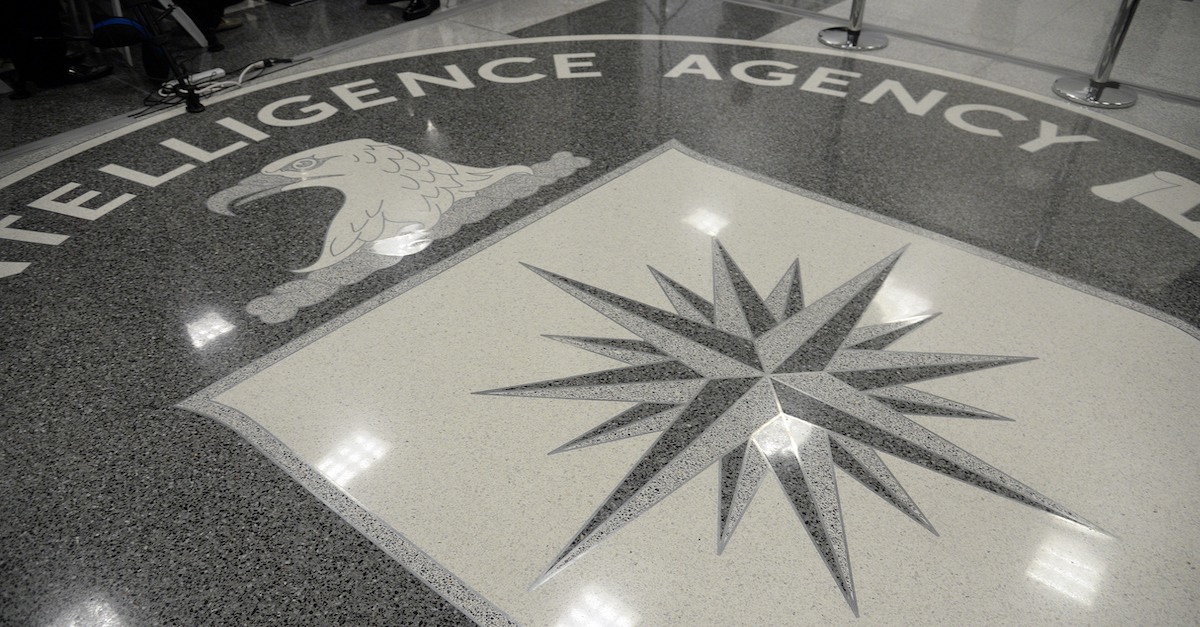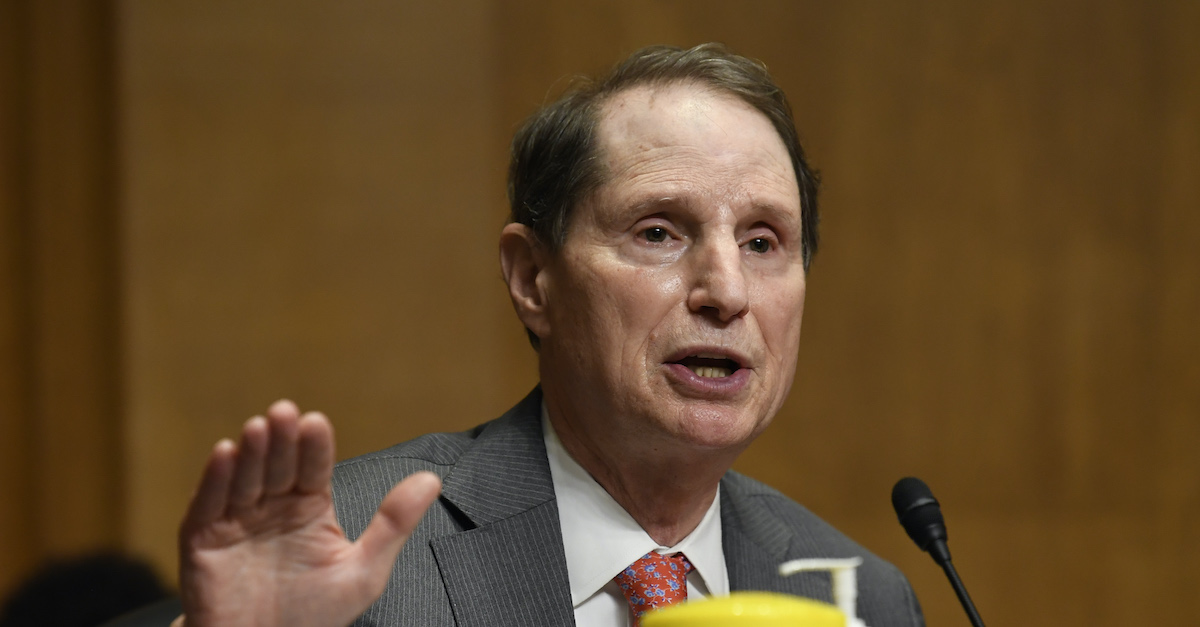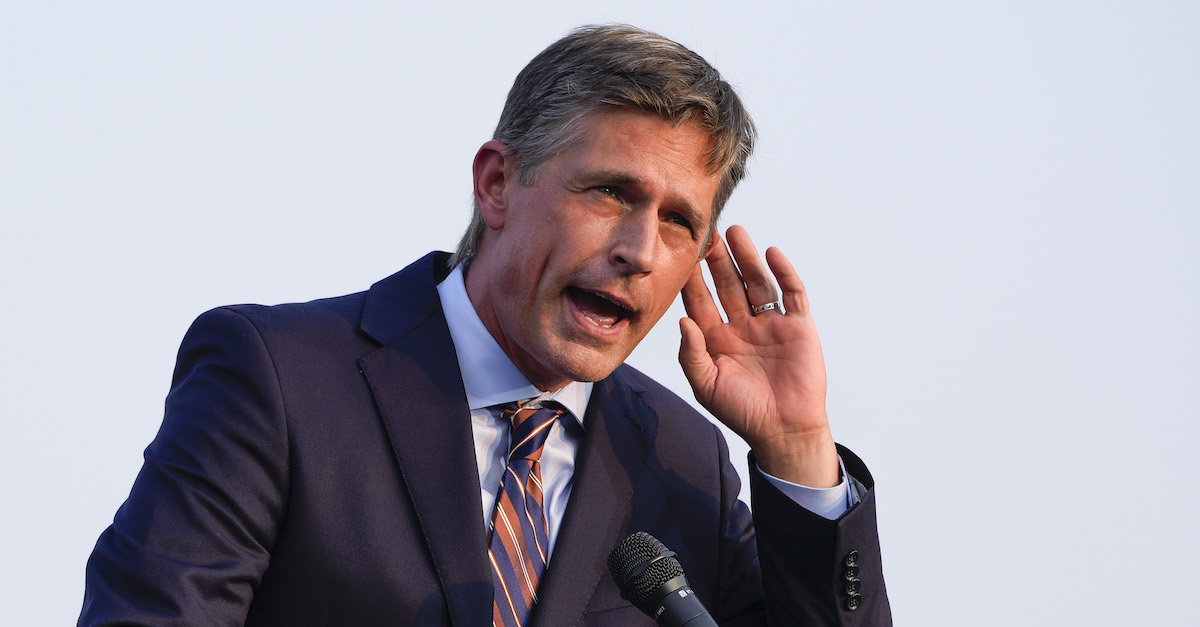
A newly declassified letter written by two U.S. senators, both Democrats, asks the Central Intelligence Agency to declassify a full report about the CIA’s “bulk collection” of data pertaining to U.S. citizens.
The senators, Ron Wyden of Oregon and Martin Heinrich of New Mexico, are both members of the Senate Intelligence Committee. They collectively wrote that “[t]he secret nature of the CIA’s activities described in” a recent CIA “report raise . . . concerns” about the need for “greater transparency” in intelligence gathering techniques and data caches. The senators asserted that “secret interpretations of law undermine democratic oversight and pose risks to the long-term credibility of the Intelligence Community.”
The broader CIA report, dubbed the “Executive Order 12333 Central Intelligence Agency Deep Dive II,” was issued by the CIA’s Privacy and Civil Liberties Oversight Board, or PCLOB, in truncated form. The senators are asking for the complete document.
According to a redacted copy of the 71-page CIA report, some of the data swept up by the agency included the financial data of some American citizens. It was snagged in an attempt to unravel the finances of the “Islamic State in Iraq and the Levant, or ISIL— an entity that the State Department has designated as a terrorist organization,” according to the report itself and an Associated Press analysis of it.
“The CIA and National Security Agency have a foreign mission and are generally barred from investigating Americans or U.S. businesses,” the AP explained in broad terms. “But the spy agencies’ sprawling collection of foreign communications often snares Americans’ messages and data incidentally.”
The documents state that CIA computer systems warn users that capturing the data of American citizens requires a purpose related to foreign intelligence. “However, analysts are not required to memorialize the justification for their queries,” the CIA’s own documents state, making it difficult to audit the data to ensure it is being properly collected and used.

Sen. Ron Wyden (D-Ore.) was photographed at a hearing on June 30, 2020. (Photo by Susan Walsh/Pool/Getty Images.)
A Wyden press release noted that “the CIA has secretly conducted its own bulk program, authorized under Executive Order 12333, rather than the laws passed by Congress” (internal punctuation omitted). Executive Order 12333 was first signed by Ronald Reagan in 1981.
The letter went on to slam the CIA for lapping up data “entirely outside the statutory framework that Congress and the public believe govern this collection, and without any of the judicial, congressional or even executive branch oversight that comes from [Foreign Intelligence Surveillance Act] collection.”
Though significant portions of the letter are redacted, it explains this much at length:
This history demonstrates Congress’s clear intent, expressed over many years and through multiple pieces of legislation, to limit and, in some cases, prohibit the warrantless collection of Americans’ records, as well as the public’s intense interest in and support for these legislative efforts. And yet, throughout this period, the CIA has secretly conducted its own bulk program.
It continues after yet another redaction:
This basic fact has been kept from the public and from Congress. Until the PCLOB report was delivered last month, the nature and full extent of the CIA’s collection was withheld even from the Senate Select Committee on Intelligence.
[Redacted.] Among the many details the public deserves to know are the nature of the CIA’s relationship with its sources and the legal framework for the collection; the kind of records collected [redacted;] the amount of American’s records maintained; and the rules governing the use, storage, dissemination and queries (including U.S. person queries) of the records. Each of these matters has been the subject of extensive declassifications with regard to NSA’s and FBI’s FISA collection; there is no reason why CIA’s activities cannot be equally transparent.
The letter seeks the declassification of the “Deep Dive II” report, two other CIA reviews, and the letter itself, which was dated April 13, 2021. The letter was declassified yesterday.

Sen. Martin Heinrich (D-N.M.) speaks during a Sept. 13, 2021 rally near the U.S. Capitol in Washington, D.C. (Photo by Drew Angerer/Getty Images.)
Some, but not all, of the CIA material has been publicly released.
The CIA wrote of its efforts in a dueling statement as follows:
In 2015, the PCLOB selected for in-depth examinations two CIA counterterrorism-related activities as part of the PCLOB’s larger E.O. 12333 oversight review. In its “Deep Dive I” and Deep Dive II” reviews, the PCLOB and its staff assessed the counterterrorism value of the two CIA programs, the impact of each program on privacy and civil liberties, and whether those national security activities were appropriately conducted in accordance with law and policies.
In direct response to the Wyden/Heinrich letter, the CIA further said it “ordered a review of the relevant materials to ensure that the information was released to the greatest extent possible, while still protecting tradecraft methods and operational sources.”
From the CIA at length:
Following this request for review, CIA determined that the PCLOB Report from 3 January 2017, referred to as “Deep Dive I,” could be released with certain redactions. The Deep Dive II report contains two separate sections. As requested by Senators Wyden and Heinrich, CIA conducted an expedited review of both sections of the report. While CIA concluded that the second section—the PCLOB’s Staff Recommendations—could be released with certain redactions, CIA determined that the other section must remain classified in full to protect sensitive tradecraft methods and operational sources.
All CIA activities must be conducted in full compliance with U.S. law. CIA’s core authority to collect intelligence stems from its statutory mandate to do so—found in the National Security Act of 1947—as well as the President’s inherent constitutional authority to collect foreign intelligence and counterintelligence information, which is expressed in E.O. 12333. The Foreign Intelligence Surveillance Act (FISA) also governs important but relatively narrow areas of intelligence collection including electronic surveillance, physical search, and certain other activities as defined in that statute. Many of CIA’s core intelligence activities fall outside the scope of the FISA, but are nevertheless governed by E.O. 12333, implementing Procedures promulgated by the CIA Director and the Attorney General of the United States, and other US law.
“[A]ll CIA officers have a solemn obligation to protect the privacy and civil liberties of Americans,” the agency continued. “CIA will continue to seek opportunities to provide better transparency into the rules and procedures governing our collection authorities to both Congress and the American public.”
The senators later reaffirmed their calls to shine light on the CIA’s Executive Order 12333 activities in a fashion similar to that focused on courts established by the Foreign Intelligence Surveillance Act.
“FISA gets all the attention because of the periodic congressional reauthorizations and the release of DOJ [U.S. Department of Justice], ODNI [Office of the Director of National Intelligence] and FISA Court documents,” Wyden and Heinrich said in a press release and in response to the newly declassified documents. “But what these documents demonstrate is that many of the same concerns that Americans have about their privacy and civil liberties also apply to how the CIA collects and handles information under executive order and outside the FISA law. In particular, these documents reveal serious problems associated with warrantless backdoor searches of Americans, the same issue that has generated bipartisan concern in the FISA context.”
Wyden and Heinrich stressed that the Director of National Intelligence had “started the process” of transparency and that they “intend[ed] to continue to urge” the level of “transparency the American people deserve.”
The senators’ letter and the CIA cache are embedded below:
(Photo of CIA seal by Olivier Doulier/Pool/Getty Images)